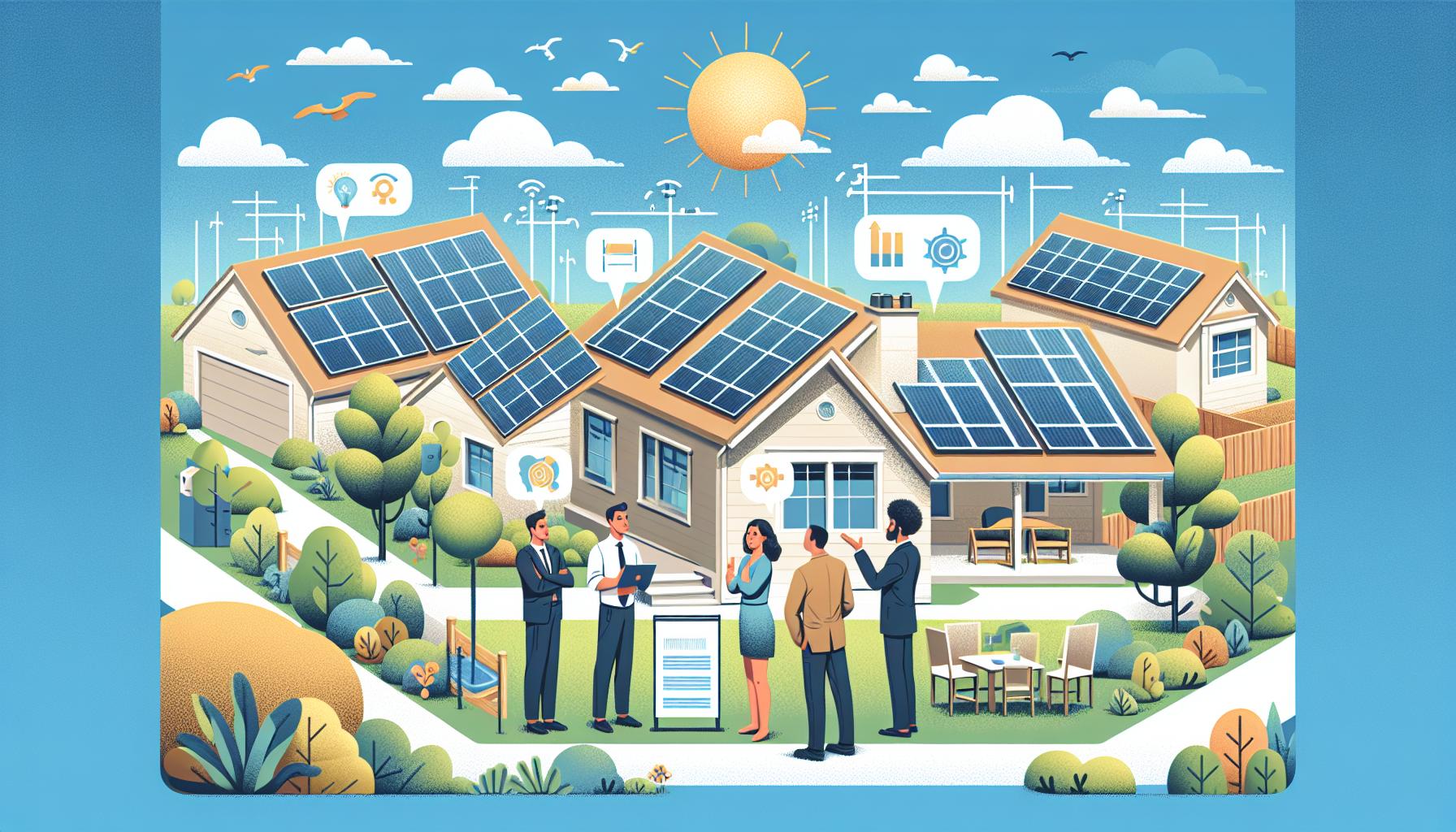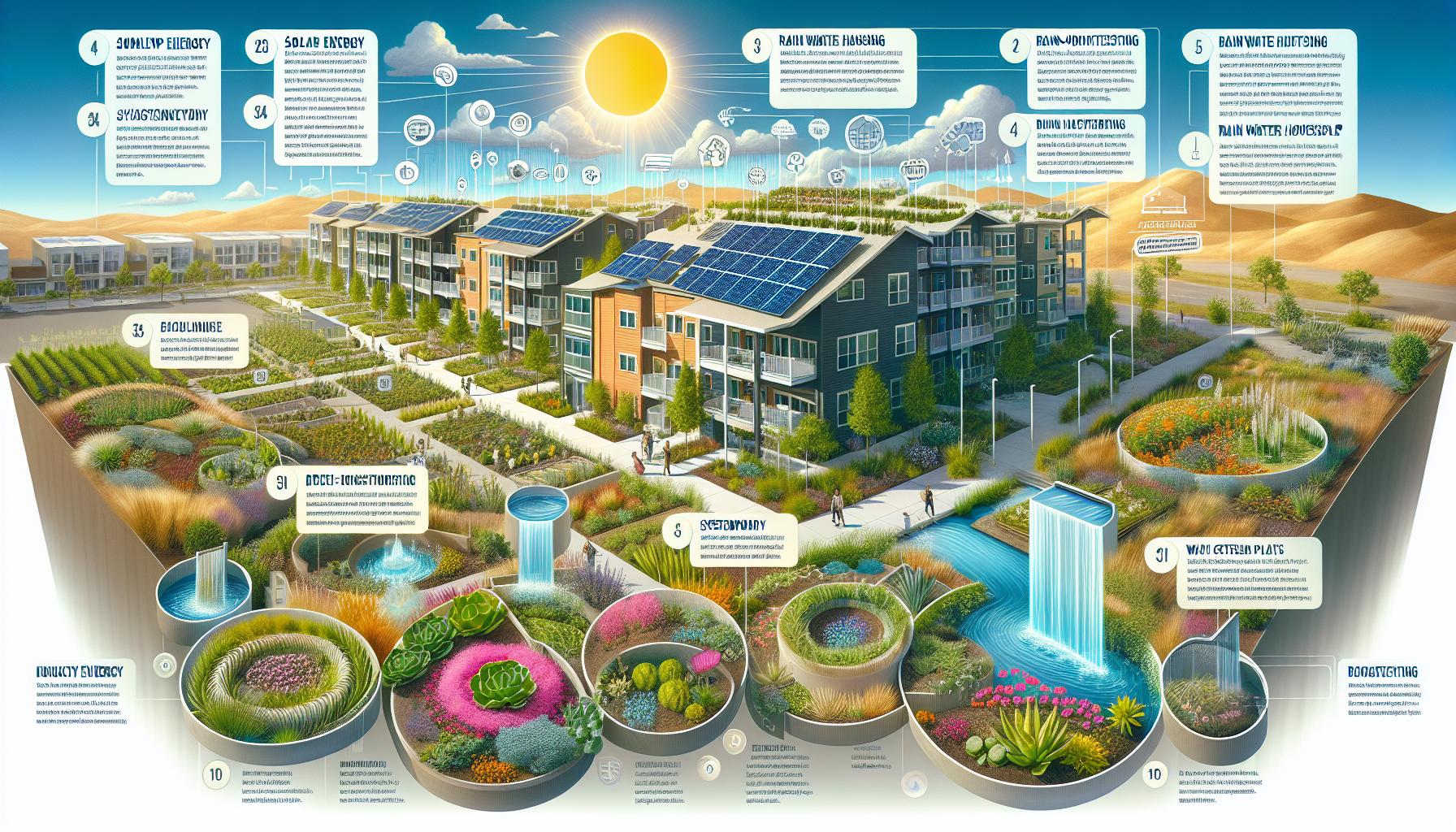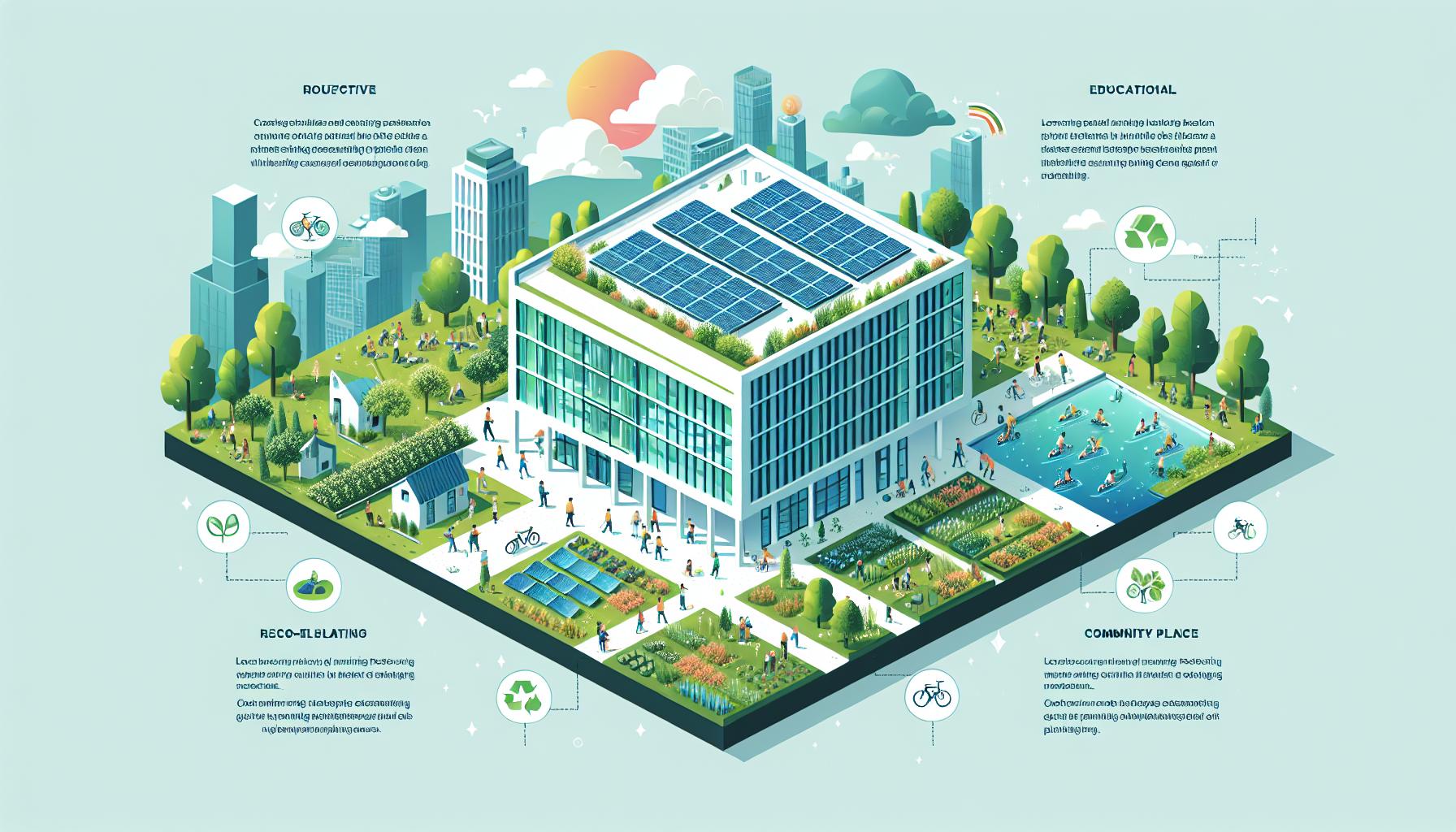Key Takeaways
- Sustainable property management in Fremont focuses on balancing eco-friendly practices with operational efficiency to reduce environmental impact and enhance long-term property value.
- Key strategies include energy-efficient upgrades, water conservation techniques, renewable energy integration, and effective waste reduction programs.
- Tenant involvement is crucial; encouraging recycling, energy-saving habits, and participation in green initiatives strengthens sustainability efforts and fosters community engagement.
- Investing in green technologies like smart building systems, automated energy management, and renewable energy installations can optimize resource use and reduce operational costs.
- Overcoming common challenges, such as budget constraints and resistance to change, is possible through financing options, education campaigns, and retrofitting solutions.
- The future of sustainable property management in Fremont highlights emerging trends like green roofs, tenant-driven sustainability programs, and advancements in technology for smarter, eco-friendly operations.
Managing properties in a way that’s both efficient and environmentally conscious can feel overwhelming. With growing awareness about sustainability, property owners in Fremont are increasingly looking for ways to reduce their environmental impact while maintaining value. But where do you start, and how do you balance eco-friendly practices with practical property management needs?
Sustainable property management isn’t just about going green—it’s about creating long-term benefits for the environment, tenants, and your investment. From energy-efficient upgrades to waste reduction strategies, there are countless opportunities to make a difference. Are you ready to explore how thoughtful management can transform your property into a more sustainable and profitable asset?
Overview Of Fremont Sustainable Property Management
Sustainable property management in Fremont prioritizes efficient resource usage and environmental responsibility. By integrating eco-conscious strategies, I focus on reducing ecological impact while maintaining property value and tenant satisfaction. These methods include energy-efficient systems, water conservation techniques, and waste management solutions.
Fremont’s commitment to green initiatives aligns seamlessly with sustainable property practices. I leverage this shared focus by incorporating renewable energy installations, such as solar panels, and promoting practices like using environmentally safe materials during maintenance and repairs. These efforts contribute to the long-term health of properties and the surrounding community.
Tenant engagement plays a significant role in sustainability. Encouraging tenants to participate in recycling programs or adopt energy-saving habits strengthens these efforts. Open communication and education about the benefits of eco-friendly living foster cooperation and trust.
What strategies could make properties both cost-effective and environmentally sustainable? It’s essential to explore solutions like smart irrigation systems or energy audits to identify areas for improvement. By employing these methods, I help property owners achieve sustainable goals while optimizing operational efficiency.
Key Principles Of Sustainable Property Management

Sustainable property management focuses on balancing environmental responsibility with operational efficiency. These principles directly impact cost savings, tenant satisfaction, and long-term property value. How can these strategies transform property management into a greener, more impactful practice?
Energy Efficiency
Efficient energy usage starts with assessing a property’s current systems. Installing LED lighting, upgrading to energy-efficient appliances, and enhancing insulation reduces energy consumption. Smart thermostats and automated lighting systems help optimize usage and control energy waste.
Energy audits identify inefficiencies and prioritize upgrades. For instance, sealing air leaks and improving HVAC systems can lower costs while reducing environmental strain. What specific changes can make the most impact for your property?
Renewable Resources
Incorporating renewable energy sources decreases reliance on traditional power systems. Solar panels, wind turbines, or geothermal systems generate clean energy while offering long-term savings. For properties in Fremont, abundant sunlight makes solar installations a practical choice.
Selecting renewable building materials helps reduce environmental impact. Options like reclaimed wood, bamboo, or recycled steel offer durability and lower lifecycle costs. How can renewable energy and materials enhance the value of your property?
Waste Reduction
Minimizing waste starts with proper recycling and composting programs. Providing clearly labeled bins and tenant education ensures better participation. Encouraging digital recordkeeping reduces paper use in property management operations.
Repurposing materials during renovations reduces landfill waste. For example, salvaging cabinetry or fixtures decreases disposal and procurement costs. By fostering tenant involvement and rethinking waste strategies, how can your property management contribute to a cleaner environment?
Benefits Of Sustainable Property Management In Fremont

Sustainable property management can transform how properties operate, benefiting both owners and communities. In Fremont, focusing on eco-friendly practices provides a range of advantages for the environment, economy, and society. Let’s explore these benefits.
Environmental Benefits
Sustainable property management significantly reduces resource consumption. Energy-efficient systems lower power usage, while water conservation techniques save thousands of gallons annually. For example, using drought-resistant landscaping or rainwater harvesting can substantially cut water needs.
Improved waste management is another advantage. Recycling programs and composting divert substantial waste from landfills, reducing the property’s overall carbon footprint. In Fremont’s eco-conscious community, integrating solar energy and environmentally safe materials strengthens environmental preservation efforts.
Economic Advantages
Efficient resource usage leads to noticeable cost savings over time. LED lighting, energy audits, and efficient heating or cooling systems reduce utility bills. Solar installations often create additional savings through tax credits or reduced electricity costs, which add value to properties.
Sustainable management also enhances long-term investment returns. Green-certified properties attract buyers and tenants looking for eco-conscious living options. This demand often translates into higher rental yields or faster occupancy rates. Wouldn’t a property that’s eco-efficient be appealing in a market that values sustainability?
Social Impact
Eco-friendly properties can foster healthier living environments. Improved air quality from non-toxic materials or better ventilation systems directly benefits tenants. Clean, green spaces, like community gardens, enhance well-being and promote outdoor activities.
Tenant satisfaction often increases with sustainable practices. Many residents appreciate recycling services or programs encouraging energy-saving habits. Engaging tenants builds a sense of community and shared responsibility. How could involving people more deeply improve tenant relationships and property appeal?
Sustainable property management in Fremont addresses long-term goals while meeting community expectations. Is your property prepared to explore these benefits?
Challenges And Solutions In Implementing Sustainability

Integrating sustainability into property management often presents practical and logistical challenges. However, each obstacle provides an opportunity to create innovative strategies that drive efficient and eco-friendly outcomes.
Common Obstacles
Limited budgets often hinder the adoption of sustainable upgrades. Larger investments, like installing solar panels or upgrading to smart systems, may seem out of reach for smaller property owners. Are financial concerns slowing your progress toward sustainability goals?
Resistance to change makes implementation tougher. Tenants and staff may view green practices as inconvenient. How do you motivate individuals to embrace new habits in daily operations?
Complex regulations in Fremont and broader areas require strict compliance. Staying updated on codes and certifications can feel overwhelming. Are you finding it tough to align property improvements with local policies?
Older properties pose structural limitations. Aging buildings might lack the foundation to support energy-efficient additions. Have outdated infrastructures made transformations more complicated?
Innovative Strategies
Financing options, like green loans or tax incentives, help overcome budget constraints. Property managers should explore these avenues to soften upfront expenses and make upgrades manageable. Have you evaluated available eco-friendly funding programs?
Education campaigns foster acceptance of sustainable practices. Clear communication about benefits encourages tenant participation in recycling or energy-saving efforts. Could tenant workshops promote engagement in your properties?
Streamlining compliance with specialized software simplifies tracking legal guidelines. These tools reduce errors and free up resources for other improvements. Are you leveraging technology to aid compliance efforts?
Retrofitting solutions enable older properties to adopt sustainable systems. Efficient insulation, LED lighting, or water-saving devices enhance performance without massive renovations. What smaller upgrades could make your property more eco-efficient?
Examples Of Successful Sustainable Properties In Fremont

Sustainable property management in Fremont has led to remarkable projects that prioritize environmental stewardship while maintaining operational excellence. Examples of these properties showcase how eco-friendly practices can significantly benefit both the community and property owners.
Case Study Highlights
One property, a multi-family housing complex, integrated solar panels and energy-efficient HVAC systems, reducing energy usage by over 30% annually. Through rainwater harvesting and drought-tolerant landscaping, water consumption dropped by 20%. The involvement of tenants in composting and recycling programs further minimized waste output.
Another success story involves a commercial office building retrofitted with LED lighting and motion sensors. Utility bills decreased by 25%, and the switch to eco-friendly cleaning products improved indoor air quality. A digital platform was introduced to monitor energy performance, allowing real-time insights for continual improvement.
Notable Achievements
Fremont’s residential developments with sustainable construction practices have gained local recognition. Using recycled materials and adopting energy-efficient designs saved resources while earning green certifications. These honors increased the properties’ market appeal.
Community engagement stands out as a recurring accomplishment. Tenants actively participating in green behavior—like energy conservation challenges and shared garden initiatives—fostered a collective sense of responsibility. These efforts contributed to measurable reductions in environmental impact.
What specific green initiatives would resonate most with your property goals?
Future Of Sustainable Property Management In Fremont

Sustainable property management continues to evolve in Fremont, bringing opportunities to align environmental goals with practical management practices. How can property owners anticipate these changes and adopt strategies that benefit both their assets and the environment?
Emerging Trends
Key trends indicate a shift toward renewable energy adoption, eco-friendly retrofitting, and tenant-focused sustainability programs. Solar installations and green roofs are becoming more prevalent to reduce energy costs and improve building efficiency. Retrofitting older properties with energy-efficient windows, insulation, and HVAC systems is gaining traction to meet stricter building codes and lower carbon footprints.
Tenant engagement remains crucial. Developers are incorporating recycling programs, offering incentives for conserving energy, and designing shared spaces to support sustainable behaviors. How might implementing these strategies enhance tenant relationships while also improving property performance?
Role Of Technology
Technology plays a significant role in modern sustainable property management. Smart building systems automate energy use, lighting, and water management for greater efficiency. Platforms that monitor and analyze energy consumption help property managers identify waste and cost-saving opportunities.
Virtual inspections and augmented reality tools streamline monitoring for maintenance and repairs, reducing transportation-related emissions. How could leveraging these innovations create a more sustainable and efficient management process?
Conclusion
Sustainable property management in Fremont is more than just a trend; it’s a transformative approach that benefits property owners, tenants, and the environment. By adopting eco-friendly practices and leveraging innovative solutions, property managers can create efficient, valuable, and forward-thinking spaces.
As the demand for sustainability continues to grow, embracing these strategies positions properties for long-term success while fostering a greener, healthier community. The future of property management in Fremont is undeniably tied to sustainability, offering opportunities to lead with purpose and make a lasting impact.
Frequently Asked Questions
What is sustainable property management?
Sustainable property management involves adopting environmentally-responsible practices to manage properties efficiently. It integrates strategies like energy conservation, waste reduction, and resource optimization to reduce environmental impact while improving operational efficiency, tenant satisfaction, and property value.
Why is sustainable property management important in Fremont?
Fremont prioritizes green initiatives, making sustainability vital for aligning with local goals. Sustainable management reduces resource consumption, lowers operational costs, and attracts eco-conscious tenants and buyers, contributing to community well-being and long-term property value.
What are the benefits of sustainable property management?
Sustainable property management offers environmental benefits like reduced carbon footprints, economic advantages such as cost savings, and social improvements through healthier living environments, increased tenant satisfaction, and community engagement.
How can property managers reduce energy use?
Property managers can install energy-efficient systems like LED lighting, upgrade to energy-saving appliances, add solar panels, and conduct energy audits. These steps reduce energy consumption and utility bills while promoting sustainable living.
What are some waste reduction strategies for properties?
Effective waste reduction strategies include implementing recycling programs, promoting composting, repurposing renovation materials, and encouraging tenant participation in sustainable waste management practices.
What are the challenges of implementing sustainable practices in property management?
Challenges include limited budgets, resistance to change, intricate regulations, and retrofitting older buildings. Overcoming these obstacles requires financing options, tenant education, and innovative tools for compliance and efficiency.
How can older properties be made more eco-friendly?
Older properties can be retrofitted with energy-efficient systems such as modern HVAC units, LED lighting, and renewable energy installations like solar panels. Additionally, using sustainable materials for upgrades and improving insulation are effective solutions.
How can tenants contribute to sustainability efforts?
Tenants can participate in recycling programs, adopt energy-saving habits, conserve water, and support property-installed eco-friendly tools and systems, such as low-flow fixtures and smart energy trackers.
What role does technology play in sustainable property management?
Technology enhances efficiency through smart building systems, energy monitoring platforms, and automation tools for controlling lighting, heating, and cooling. These innovations reduce resource use and improve sustainability practices.
Are there examples of successful sustainable properties in Fremont?
Yes, Fremont features numerous success stories, including residential buildings reducing energy use by 30% with solar panels and office buildings lowering utility bills by 25% with energy-efficient retrofits.
What future trends are shaping sustainable property management?
Emerging trends include wider adoption of renewable energy, eco-friendly retrofitting practices, tenant-centric sustainability programs, and smart technologies like energy monitoring systems to enhance operational efficiency and reduce emissions.
Does sustainable property management increase property value?
Yes, eco-friendly properties often attract eco-conscious tenants and buyers, leading to higher demand. Sustainable upgrades, energy efficiency, and green certifications significantly enhance long-term property value and investment returns.
